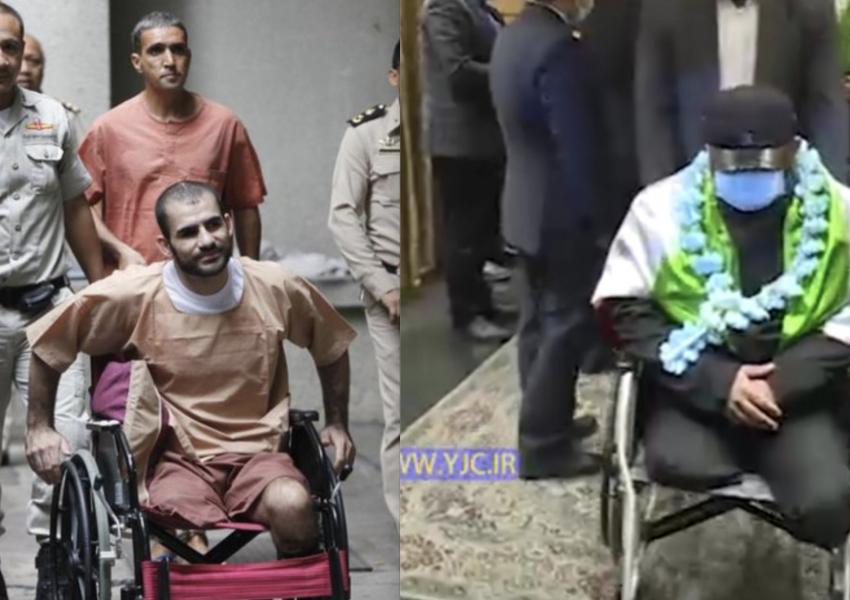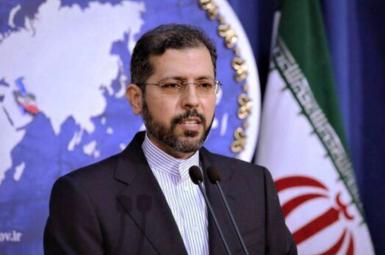
Jailed Australian-British Academic Released In Iran Prisoner Swap
Kylie Moore-Gilbert, an Australian-British academic imprisoned in Iran since September 2018, has been exchanged with three Iranians in prison abroad, the Young Journalists Club (YJC), a news agency affiliated to Iran’s state-run television (IRIB), reported on Wednesday. Social media posts suggest that two of the Iranians are those convicted on bombing charges in Thailand.
A video clip on the YJC website showed Moore-Gilbert anxiously waiting with two other women while three men draped in Iranian flags, including one in a wheelchair, were escorted into the room. The video had no commentary and the men were described only as “one businessperson and two Iranian citizens” imprisoned “on bogus charges abroad.”
Moore-Gilbert was then allowed to leave with her two companions in a van, presumably either to the Australian Embassy or the airport. Iranian officials present in the room welcomed the three men whose faces were covered by masks, perhaps in line with Covid19 regulations.
Iranian social media users quickly suggested that two of the three men released are Saeid Moradi, 36, and Mohammad Khazaei, 50, who were sentenced respectively to life and 15 years in prison in Thailand in 2013s over an explosion in Bangkok on Valentine’s Day 2012. This followed after earlier bomb attacks in India and Georgia targeting Israeli diplomats.
During his arrest, Moradi’s legs were blown off when a bomb he tried to hurl at police on a Bangkok street exploded at his feet. Today’s pictures posted on social media of the released, masked amputee in the wheelchair in Tehran resemble pictures of Moradi leaving the Bangkok court in a wheelchair in 2013 to begin his prison sentence.
Moore-Gilbert, a lecturer in Islamic studies, was imprisoned under charges of espionage for Israel and sentenced to ten years in prison. No evidence of her alleged crimes has ever been made public, although Iranian news agencies have now said she was affiliated with foreign intelligence services including Britain’s MI6 and Mossad, and was trained by Israeli Army Intelligence.
Iran has detained several foreign nationals and dual citizens over the years on espionage charges. It currently holds several, including German-Iranian women’s rights activist Nahid Taghavi, British-Iranian businessman Anoush Ashoori, British-Iranian Thomson Reuters Foundation manager Nazanin Zaghari-Ratcliffe, American-Iranian businessman Siamak Namazi and his 82-year-old father Bagher Namazi, as well as Swedish-Iranian academic and doctor Ahmad-Reza Djalali who is in danger of imminent execution.
Moore-Gilbert, who lectures at the University of Melbourne, was in Iran on a study program for foreign academics when arrested. In letters smuggled out of Tehran’s Evin Prison published by British media in January, she said she had been subject to psychological torture and had attempted to take her own life. She also alleged that Revolutionary Guard intelligence officers had tried to force her to spy for Iran in return for a reduced sentence.
After more than two years of tightening United States sanctions under President Donald Trump, Iran’s leaders have expressed hope of improving relations with the incoming US administration under Joe Biden. The issue of foreign nationals and dual citizens detained in Iran after conviction on espionage charges in closed-session courts could complicate international negotiations, not just with Europe but with a Biden administration committed to greater respect for human rights.









